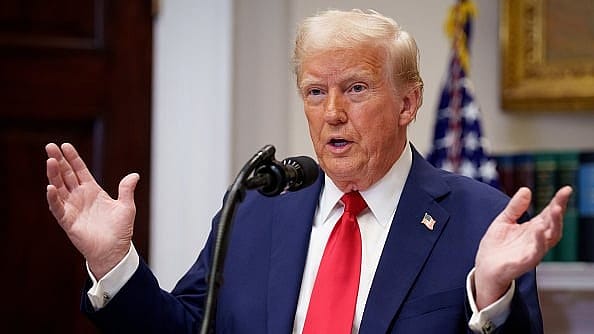Donald Trump says he told Apple’s Tim Cook to stop manufacturing in India: ‘They can take care of themselves’
ADVERTISEMENT

President Donald Trump has said that he personally urged Apple CEO Tim Cook not to expand the company’s manufacturing operations in India, even as Apple moves to shift production out of China amid rising tariffs and geopolitical tensions.
Speaking at an event in Qatar during his three-day visit to the Middle East, Trump said he spoke to Apple CEO Tim Cook. The two spoke after the recent U.S.-China trade agreement in Geneva, which included a 90-day pause on most tariffs between the two countries.
“I said to him you're coming here with $500 billion. But now I hear you're building all over India. I don't want you building in India. You can build in India if you want to take care of India because India is the highest one of the highest tariffs nations in the world. It's very hard to sell into India and they've offered us a deal where we're basically they're willing to truly charge US no tariff,” said Trump during the event.
“We're not interested in you building in India, (they) can take care of themselves. They're doing very well,” he added.
In March, Apple had announced its plans to invest more than $500 billion in the United States over the next four years, including plans to hire 20,000 people and build a new server factory in Texas, following another request by Trump to shift its manufacturing from Mexico to the U.S.
Trump's assertions come just days after Cook confirmed the tech giant’s plans to diversify its supply chain. The company reportedly aims to manufacture most of the iPhones it sells in the U.S. at Indian facilities by the end of 2026. In March, Reuters had reported that Apple shipped around $2 billion worth of iPhones from India to the U.S., including $1.3 billion from Foxconn.
Production costs in India are estimated to be 5–10% higher than in China, but Apple sees the move as a hedge against tariffs and disruptions from ongoing U.S.-China tensions.
Meanwhile, during the same Qatar event, Trump added that India has offered to eliminate tariffs on U.S. goods in a bid to secure a broader trade agreement. “India has offered us a deal where basically they are willing to literally charge us no tariff,” Trump said, without offering further details. The Indian government has not issued a statement on the claim.
Apple already bullish on India, but why?
Apple CEO Tim Cook during the second quarter earnings call said that company expects a majority of iPhones sold in the U.S. in the June quarter to be manufactured in India, a key shift in the tech giant’s supply chain strategy as it navigates intensifying U.S.-China trade tensions.
Responding to an analyst during Apple’s March quarter earnings call, Cook said that while he wouldn’t predict long-term sourcing trends, iPhones bound for the U.S. would primarily originate from India. Vietnam is set to become the main origin country for iPads, Macs, Apple Watches, and AirPods sold in the U.S., while China will remain dominant for sales outside the U.S.
Following the May 12 U.S.-China trade truce, the US has reduced tariffs on Chinese imports from 145% to 30% for a 90-day period. However, smartphones, including iPhones, are exempt from these tariffs. This exemption means that Apple currently does not face any U.S. import tariffs on iPhones manufactured in China.
Despite the exemption, the pivot thus comes as Apple remains cautious due to the temporary nature of the truce and the potential for future tariff changes. The company continues to diversify its manufacturing operations, increasing production in countries like India and Vietnam to mitigate risks associated with U.S.-China trade tensions.
Recent reports also suggest that the tech company is considering raising iPhone prices in its next lineup to offset rising costs. Cook during the call had said that Apple could face up to $900 million in tariff-related costs this quarter but did not confirm any pricing decisions.
And China worries continue to mount
It’s important for Apple to heed the U.S. President, given that the company’s strong revenue from the Americas is driven largely by its dominant position in the U.S., where it holds the largest smartphone market share by a wide margin. The U.S. accounts for about 42% of Apple’s net sales and has the highest concentration of Apple Stores, its flagship retail chain, data from Statista shows.
In contrast, Apple’s position in China, its other key market, is weakening. iPhone shipments to China fell nearly 50% year-on-year in March to 1.89 million units, as domestic brands like Huawei, Vivo, Xiaomi, and Oppo gained share. Apple has now dropped to fifth place with a 14.1% market share.
A government-backed 15% subsidy on devices under 6,000 yuan has also hurt Apple, whose iPhone 16 is priced just above that threshold. Cook also acknowledged “persistent headwinds” in Greater China, where revenue fell 2% in the March quarter, following an 11% drop during the holiday season.
Trump's recent statement could be a major blow to India's plans to host Apple’s manufacturing facility. However, whether it can have some tangible impact on Apple’s India plans, only time will tell for now.